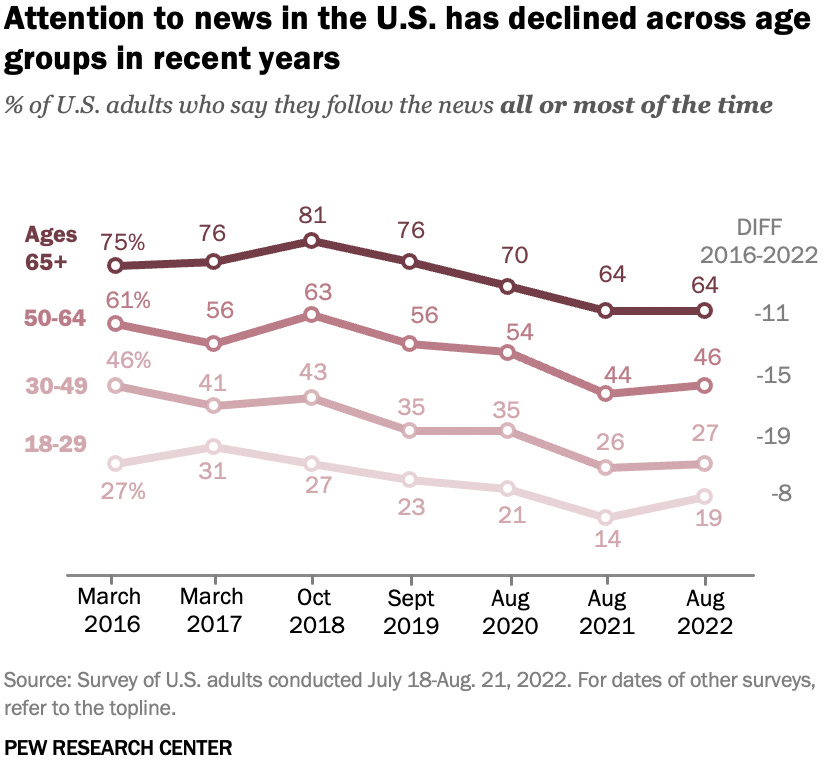Sick and Tired of the News?
You’re not alone.
According to a new analysis from the Pew Research Center, fewer Americans than ever are paying regular attention to news and current affairs. Although the current wave of research is part of a panel study conducted in 2022, and things may have changed somewhat given recent events, these data raise a simple fact often overlooked by political analysts: Most Americans are fed up with the news media itself or simply don’t care enough to tune into the regular bad news, violence, corruption, and political divisions that constitute most media coverage these days.
Professional politics and many actions by the government—as covered endlessly by the media—are essentially of little to no interest to large percentages of Americans.
Consider this: From March 2016 to August 2022, the percentage of American adults who reported following the news “all or most of the time” dropped from 51 percent to 38 percent, according to the Pew study. One-third of U.S. adults in 2022 said they follow the news at least “some of the time” while just under three in ten said they pay attention to the news “only now and then” or “hardly at all”.
Declining attention to news spans all age groups but age differences remain stark. As seen in the chart below, around two-thirds of those ages 65 or older say they follow the news “all or most of the time” (down from a high of 81 percent in 2018) compared to less than one-fifth of those ages 18 to 29. The largest declines in news attention over this period were found among working-age and pre-retirement Americans—for example, more than six in ten Americans ages 50-64 paid close attention to the news in 2016 compared to less than half in 2022.
Pew doesn’t go into elaborate detail about why these declines in news attention are so pronounced but they do mention that it occurs in conjunction with shifts in media consumption towards digital devices, overall declining trust in the media and other institutions, and “high levels of news fatigue” across demographic groups.
It appears people are just worn out by news and politics these days and don’t really know who or what to trust. These feelings are particularly pronounced among Republicans, who had one of the sharpest declines (20 points) in regular attention to the news reported by any demographic or partisan group.
The lack of attention to news among most Americans is perfectly understandable given modern life. It’s easier for people to do something else with their time and find more enjoyable distractions that don’t involve keeping up with the latest implosion in the House of Representatives, fights between dumb politicians, or what new conflict is flaring up in another part of the world.
The problem for American governance, of course, is that declining public attention to news hasn’t produced a simultaneous calming of public tensions.
In fact, the opposite is true.
Even as fewer people than ever are paying close attention to what is actually going on in America and the world, more and more Americans (and politicians) are piping off routinely—online, in the workplace, and in family gatherings—with hard-and-fast opinions about what it all means.
This doesn’t produce the most civil political discourse or measured policy making.
These trends can be chalked up to poor choices by citizens and leaders, or bad business decisions from many media companies, but the net result is a more divisive and less informed citizenry coupled with a clear inability of major institutions and political parties in America to do anything cooperative on common economic, security, and social problems.
In a pluralistic society like ours—with important rights to freedom of speech and individual beliefs—it is not the job of government or others to coerce people into paying more or closer attention to what is going on.
But media companies, government bodies, and philanthropists could certainly put more money and effort into creating trustworthy news platforms for reporting important facts, presenting neutral analyses, exploring successes and failures in public policy, and hosting civil discussions about the important issues shaping the country.
If you build it, they will come—and maybe more people will pay attention this time!



